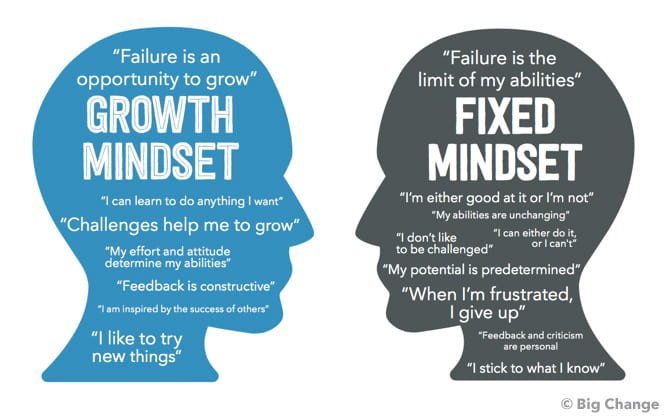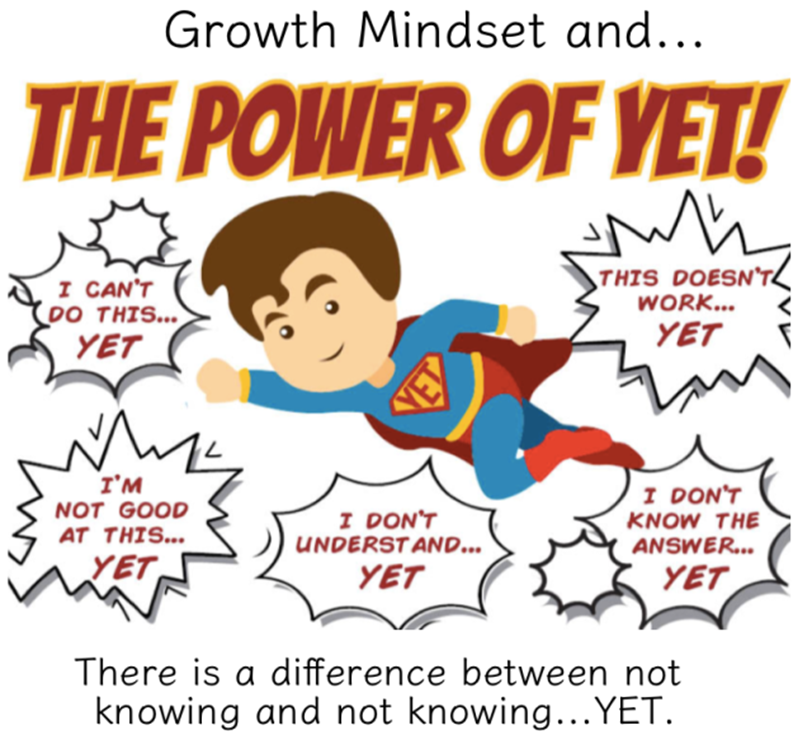There are two types of mindset, a Fixed Mindset and a Growth Mindset.

FIXED MINDSET – you believe you are either born with talent or not. Your either naturally good at something or not. You believe intelligence is a fixed trait and inborn talent determines success.
GROWTH MINDSET – you believe talent comes through effort. Anyone can be good at anything. Your abilities can be developed through dedication, perseverance and the right strategy.
Here is an example of a fixed mindset against a growth mindset:
In a fixed mindset, you are putting in the handwork but you are not seeing instant results, you have a bad weekend and feel like a failure, so you give up because it is just too hard and you think it won’t work for you anyway. In a growth mindset, you have setbacks but you learn from them and keep following the process without worrying about the results, you don’t even think about the results you trust in the process and enjoy it because you are learning new things.
NEUROPLASTICITY
The brain is not hard-wired, it is actually very plastic. Neuroplasticity can be defined as the ability of the brain to change continuously throughout your life. Connections in the brain are constantly becoming stronger or weaker, with every repetition of a thought or emotion you reinforce with specific neural pathways and if frequently repeated these small changes end up changing the way your brain works, this is how new habits are formed. So there is nothing preventing you from learning something new, tackling a new challenge, or getting out of your comfort zone and this is what having a growth mindset is.
FIXED MINDSET TRIGGERS
A fixed mindset trigger is something that shifts your mindset away from thinking that you can improve. If you can’t pinpoint your triggers you might have a false growth mindset – everyone has a fixed mindset at one time or another about one thing or another, we do not permanently have either a fixed or growth mindset. You might have a growth mindset regarding say your career, where you push to improve but a fixed mindset regarding your nutrition, where you give up as soon as you get a setback.
So, what are the triggers:
- HAVING TO WORK HARD – if hard work is one of your triggers you may get overwhelmed by tasks that require sustained effort and be more likely to give up. Another sign is if you tend to compare yourself to others, and you feel discouraged when it seems like it requires less effort for them to achieve the same goals. It doesn’t mean you are lazy, it just means you have a self-limiting belief.
- FACING SETBACKS – things go wrong in life, and we have setbacks. Here is an example: You decide to go on a diet but on the first day it’s a colleague’s birthday and you feel you have to accept a piece of their birthday cake. With a growth mindset, this wouldn’t be a big deal, you’d just get back on track the next day. But if this is a trigger for you, you may stop the diet altogether because you feel like you have failed!
- GETTING NEGATIVE FEEDBACK – Feedback can be very useful, it can be a way to learn, look at professional athletes, they get a ton of feedback and it can be harsh feedback too, but they listen, they learn and they apply the feedback. But if this is your trigger you might feel like if you didn’t do well then you are not good enough and take it personally.
- BEING CHALLENGED – being out of your comfort zone is one of the best signs you are learning and growing. Unless you are getting stretched, you are simply repeating stuff you already know. If your mindset trigger is being challenged, it means that when you try to work on something and the solution you try doesn’t work, you believe the goal is too hard and you may quit altogether.
- SEEING SUCCESS IN OTHERS – comparing yourself to someone who you think is more senior or has more experience and what your brain does not get is that these people have been working at it for longer than you and there is no reason you wouldn’t get similar results if you put the effort in too. It can be intimidating to hang out with people who are more advanced than you in their journey.
HOW TO DEVELOP A GROWTH MINDSET
By changing your thinking of effort and failure, you can design a whole new approach to your life. Developing Self-Awareness, if you don’t give much thought to your role in your success or failure, it is going to be difficult for you to strategize and improve.
- NEUROPLASTICITY – your brain structure is not fixed and your mind should not be fixed either.
- PROCESS OVER RESULTS – it’s all about the learning process, don’t worry about the results just make sure you learn as much as possible.
- ACKNOWLEDGE YOUR WEAKNESSES – ignoring your weaknesses means you will never improve.
- PURPOSE – people with a growth mindset have a greater sense of purpose. Keeping asking “WHY”
- STOP SAYING FAILURE, SAY LEARNING – always learn from your mistakes or failures – what can you learn from it to make it better next time?
- EFFORT OVER TALENT – if you put the work in you will achieve the talent.
- CHALLENGES ARE OPPORTUNITIES – challenges are an opportunity for self-improvement.
- GROWTH BEFORE SPEED – it takes time to learn. Think realistically about the time and effort it will require to acquire a new skill or habit. Don’t expect to master everything or get results in one session.
- DON’T CHASE APPROVAL – when you prioritise approval over learning, you sacrifice your own potential for growth. If you do something well also ask yourself what you can try to do better next time.
- CRITICISM – see it as useful , don’t let it destroy you.
- REFLECT – use journaling to reflect on your personal growth, either once a day, week or month.
- PERSEVERANCE – grit and determination will help you overcome challenges and when you do it once remember you can do it again.
- “NOT YET” – use the “not yet” to any fixed mindset statement, remind yourself that you haven’t mastered it YET!
Here are some questions you could use each week to start building a more growth mindset, think about answering them every Sunday, ready for the week ahead:
- What am I struggling with right now?
- What do I want to learn/achieve by the end of this week?
- What can I try that will get me out of my comfort zone?
- Who can I reach out to for help this week? (do not do this alone, it’s what I set this group up for)
Now do daily reflections as well, as this will really help you foster a growth mindset and look at failure as learning, answer these questions each evening:
- What did I do today that made me proud and what else could I do to improve?
- What new strategies did I try to achieve my goals today?
- What mistakes did I make that taught me something?
Remember, this is not going to happen overnight, don’t try to change everything at once from the above list, start with one thing and practice that first then once you feel you have mastered that move on to the next one. Enjoy the process……..

